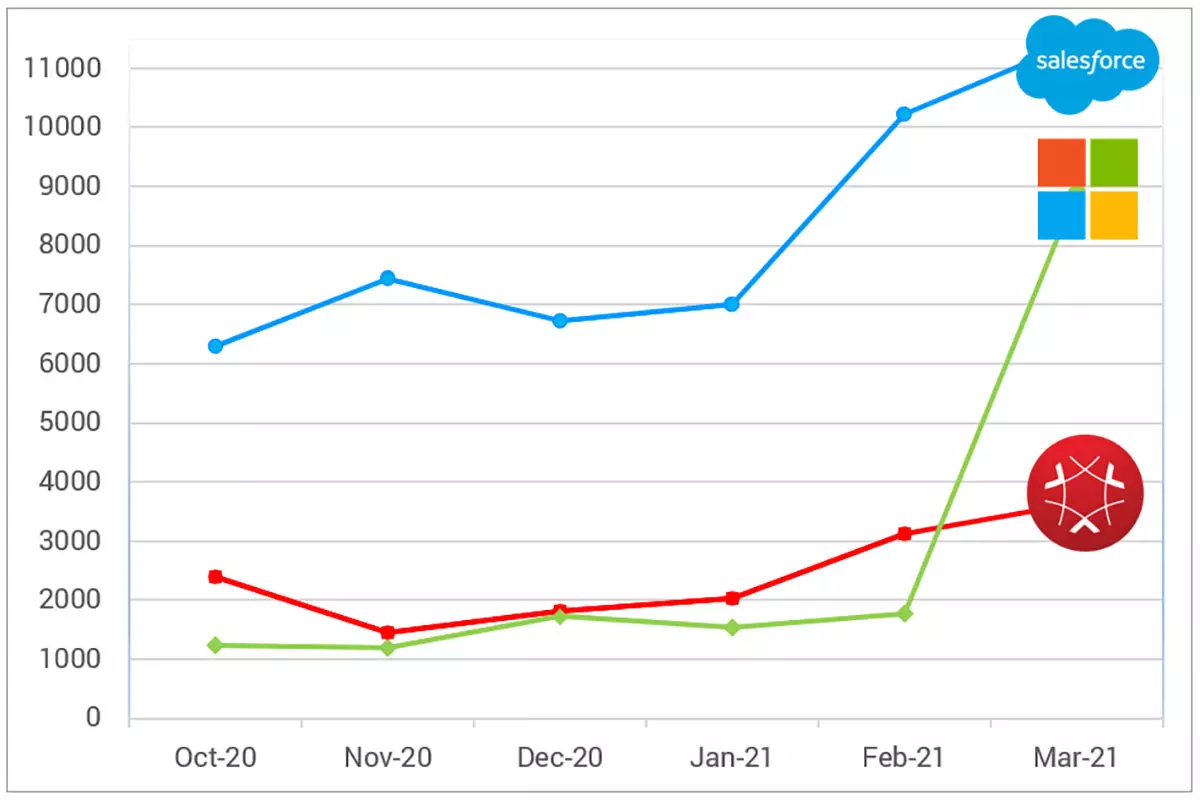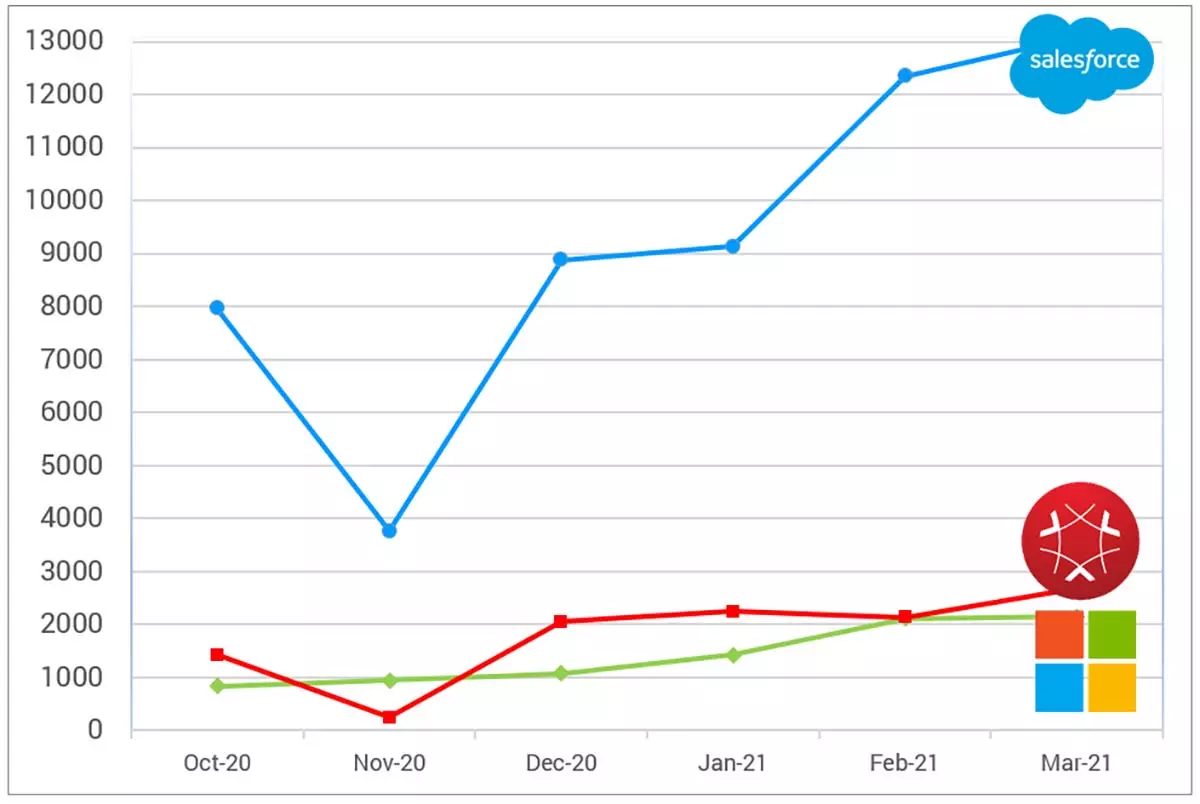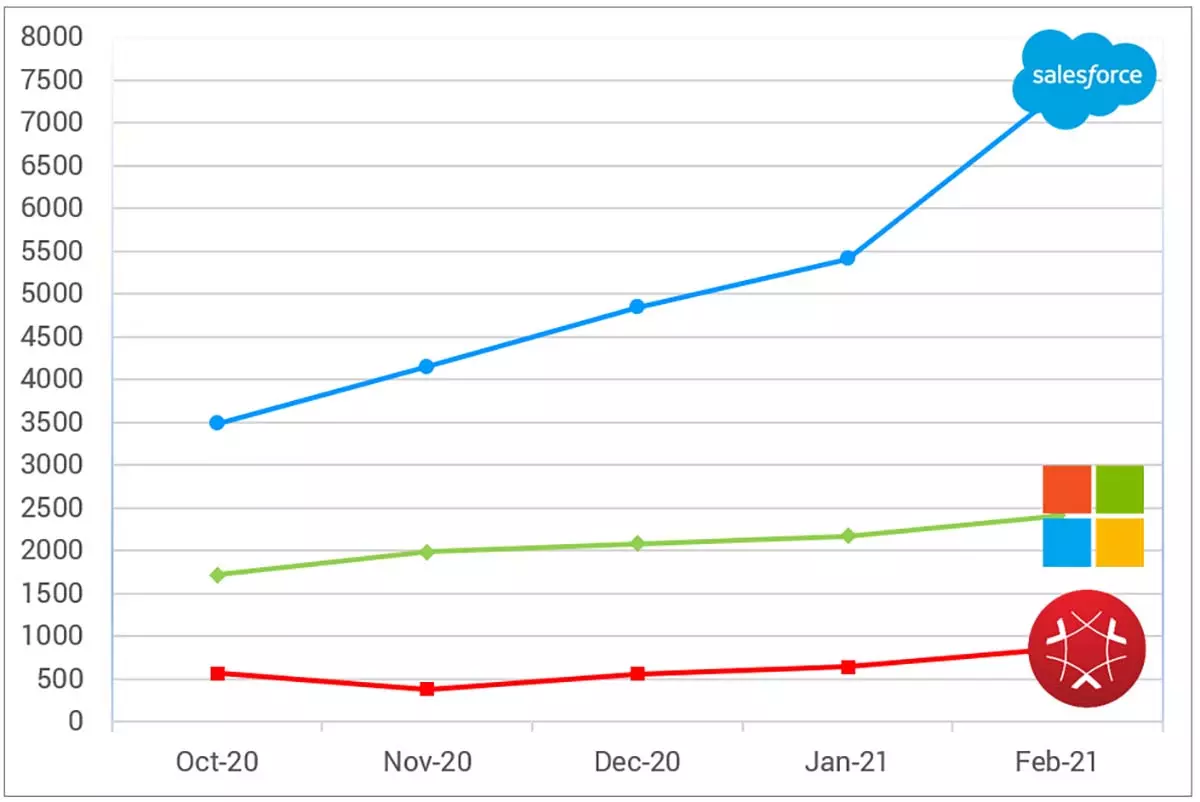CRM refers to Customer Relationship Management, a system through which an organization maintains good relations with its customers, suppliers, and employees. CRMs were typically used to improve marketing, sales, and customer service processes. However, they have now expanded in scope to operations, supply chain, human resources, finance, and much more.
Some of the major players in the CRM industry are Salesforce, SAP, Oracle, Microsoft Dynamics 365, and Adobe Experience Cloud. Why is this industry gaining importance and why are careers in CRM so lucrative?
The global CRM industry is growing by leaps and bounds, expected to reach an incredible $81.9 billion by 2025 and $114.4 billion by 2027. The industry is showing no signs of slowing down. On the contrary, the accelerated digital transformation fueled by the COVID-19 pandemic is contributing additional momentum. CRMs are used across the organization, so knowledge of CRMs is fast becoming a job requirement. As a result, a CRM career is very lucrative. Better yet, many of these jobs do not require coding knowledge.
So what CRM career path can you choose and what is the career trajectory?

These figures have been updated as of October 2021 and reflect the salaries posted on popular job boards. All salaries are annual and for junior professionals. Gaining experience and expertise leads to proportional increases in salaries.
These CRM career opportunities do not need applicants to have technical backgrounds. Rather, the users need to be able to use the CRM to complete their everyday tasks. You can become a Marketing Specialist, Sales Specialist, Service Specialist, or CRM Community Specialist. Alternatively, you can occupy one of the myriad other jobs available. Entry level positions pay $50,000-$86,000 a year.
Marketing Specialists in the customer relationship management industry create personalized customer experiences using the 360⁰ customer insights offered by the CRM. Sales Specialists leverage the features of a CRM to better understand leads, make interactions relevant, and close more deals. On the other hand, a Customer Service Specialist uses a CRM to better understand customer cases, preferences, and purchase history. This enables them to quickly resolve customer issues.
Executive level users also need to know how to use customer relationship management systems. This is important so they can better set goals, track progress, set the budget, and analyze the business’ strengths and weaknesses.
The next rung on the CRM career ladder is that of a CRM Administrator. CRM Administrators implement the CRM, set up users, resolve any issues, and create reports and dashboards. This position does not require any coding knowledge either and pays an average of $96,000 a year for entry level positions. The graph below shows the CRM Administrator jobs posted each month for three popular CRM providers: Salesforce, Adobe Experience Cloud, and Microsoft Dynamics 365. Not only are there many CRM jobs available, but they have also been increasing in number over the past few months.

CRM Admin jobs posted over a 5-month period

Our suggestion is to sign up for a 12-week bootcamp to master the skills you need to become a CRM administrator. An instructor will teach you how to master the CRM, attempt hands-on exercises on the CRM, and complete projects. By the end of the bootcamp, you will be trained for a number of different CRM roles and our Outcome team will help you land a good job.
The organization problem-solvers, CRM Business Solutions Analysts map out ways to improve processes and resolve user issues. By analyzing data, they uncover insights that can help improve business operations. CRM Business Solutions Analysts also collaborate with all stakeholders to get their feedback. This helps them figure out inefficiencies affecting the work. This CRM career also does not require a technical background. It pays slightly better than the CRM Administrator position: $104,599 a year (entry level pay) and requires a stronger problem-solving bent.

CRM Business Solutions Analyst jobs posted over a 5-month period
A CRM Admin course is a good starting point for learning the skills needed by a CRM Business Solutions Analyst. Our Salesforce Administrator short course will get you trained in 4 weeks through part-time classes. We will soon introduce customized courses for the CRM Business Solutions Analyst position as well.
If you want to be able to fully customize a CRM and build new features from scratch, you must learn how to code. CRM Developers automate repetitive tasks and make processes more efficient for stakeholders. They implement the suggestions of CRM Business Solutions Analysts and CRM Administrators. In addition, they build complex applications on the CRM platform to fulfill business needs. CRM Developers also troubleshoot technical issues and develop technical documentation.
The more accomplished a CRM Developer, the higher the salary. The latter also increases exponentially based on the popularity and complexity of the CRM. Salaries start at approximately $121,800 a year. Senior developers of popular CRMs can earn as much as $170,000 a year.

CRM Developer jobs posted over a 5-month period
The pinnacle of the CRM career trajectory is becoming a CRM Technical Architect. A CRM Technical Architect is the ultimate CRM authority who is responsible for strategizing to ensure the business is successful. He/she designs robust, secure, and efficient CRM systems to solve critical problems. CRM Technical Architects also create plans for implementing these designs, communicating them to stakeholders and getting their buy-in. A junior CRM Technical Architect gets paid around $150,400 a year.

CRM Technical Architect jobs posted over a 5-month period
You will not find many organized resources for learning CRMs. Nor are they structured to help you progress from one role to another. However, with the right guidance, curated study material, and, most importantly, hands-on exercises, climbing up the career ladder is possible.
The beauty of CRM jobs: all these positions pay very well, with increments on gaining more experience and…wait for it…earning certifications. The more certifications you earn, the better your job prospects and the higher your salary. Dedicated study, guidance from experts, and practicing with projects and certification prep exams can accelerate your journey.
So what are you waiting for? Choose a CRM career path and start learning today.






